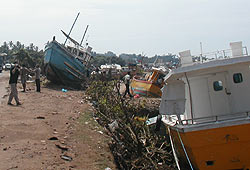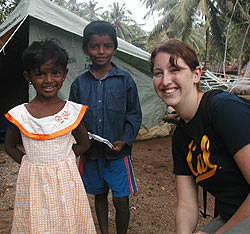Berkeleyan
Haas School student brainstorms 'quick and easy' tsunami-relief strategy
Clausen Center, Acteva link up to aid Sri Lankan NGO
![]()
| 16 February 2005
The Clausen Center for International Business and Policy at the Haas School of Business has teamed up with an online events organizer on a novel approach to raising funds for a Sri Lankan organization involved in rebuilding the tsunami-ravaged country.
 The tsunami left boats tossed like driftwood along the edge of a busy road in Sri Lanka’s hard-hit Galle District, where Anne Marie Edwards pitched in to help. (Photos courtesy Anne Marie Edwards) |
In the past, contributions to Sewalanka from the United States could be made only through a wire transfer or by sending a check through the mail, said Sebastian Teunissen, executive director of the Clausen Center and an adjunct professor at the Haas School. The new arrangement with Acteva and Sewalanka enables quick and easy donations via credit card.
Another plus, Teunissen says, is that Acteva maintains contact information so that Sewalanka can report back to donors about what is being accomplished and even send photos as a project gets finished or a new one begins. "Donors can feel that they are involved in this," says Anne Marie Edwards, the 27-year-old Haas MBA student who helped set up the system. "They can say, 'I didn't just give money, I bought uniforms for a child.' It's more inspiring for the donor."
 Haas MBA student Anne Marie Edwards, posing with Sri Lankan children in a refugee camp, helped set up a novel tsunami-relief fundraising program after traveling to the hard-hit nation. |
Edwards also started fundraising right after the tsunami. Drawing from other Haas students and "20-somethings," she collected an impressive $2,200 in one day. The ability to help "absolutely sustained me," she says.
"Anne Marie's experiences and her vivid descriptions of the need for assistance were instrumental in mobilizing the Clausen Center and Acteva to create this alliance with Sewalanka," says Haas' Teunissen.
Because Sewalanka has operated for 10 years in Sri Lanka and three years in the Galle District — dealing primarily with repercussions of the country's long-running rebel conflict and the relief needs it has generated — it was relatively easy for the organization to respond quickly to the disaster, Edwards said. But while authorities hope to have significant reconstruction finished within approximately 18 months, she noted, it will take years for Sri Lanka to return to normal. About a million Sri Lankans were displaced, and 31,000 died.
Four projects recently financed by contributions to Sewalanka include providing school supplies and uniforms to 230 children, offering emergency help to 120 university students and 250 schoolchildren who were affected by the tsunami, supporting the job recovery of 422 lagoon fishermen, and getting dry food to 600 families.
All donations go directly to the foundation, and Acteva is donating to the relief effort all fees it would normally charge for its services. Donations are not yet tax-deductible, but that is expected to change very soon, according to Edwards. To donate to Sewalanka, visit www.acteva.com/go/slf. The foundation's own website is at www.sewalanka.org/index.htm.

